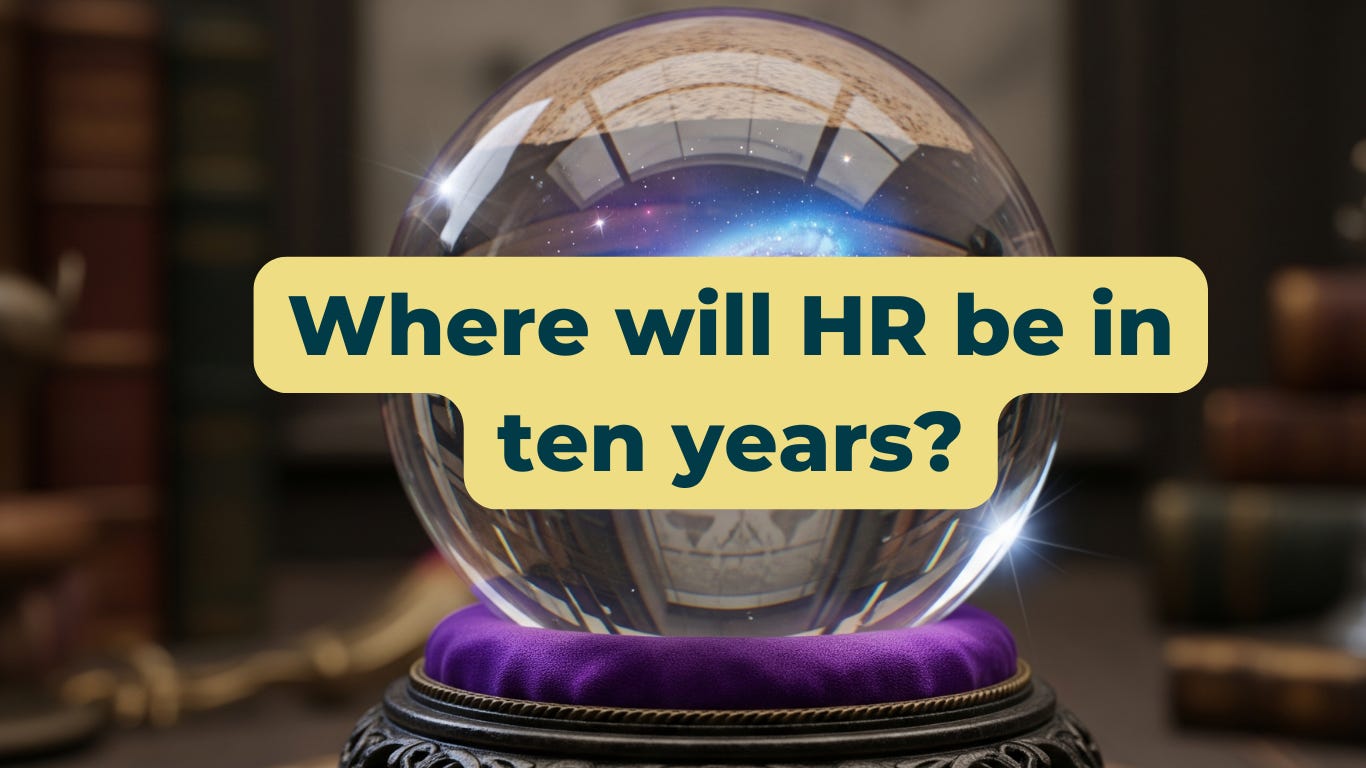Where will HR be in ten years?
Not more human, but more complex.
Welcome to FullStack HR, and an extra welcome to the 12 people who have signed up since last edition.
If you haven’t yet subscribed, join the 9700+ smart, curious and like-minded future of work people by subscribing here:
Happy Tuesday,
Next week is THE big week. It’s HR Tech in Vegas.
For the second time, I’ll be flying over to one of the world’s largest HR fairs and I do look forward to it! I expect it to be mainly around…well…AI?
If you are in Vegas, ping me and we’ll grab a beer (or coffee).
If you are not in Vegas, stay tuned for the updates. I update continuously throughout the week, mainly on LinkedIn, and also through posts here.
Now, let's look ahead to where HR will be in 10 years from now.
When hosting a lecture for a large HR team the other week, someone asked me, “Where do you think HR will be in ten years?”
I mumbled something vague, because the truth is: I can see it going in both directions. HR could matter more. Or less.
But the question stayed with me. So I started thinking, digging around a bit more seriously, and looking at the data. What actually points us one way or another? And what do I really think?
Fewer people, more work
The first thing to notice is demographics. The OECD projects that the working-age population in member countries will shrink by 8% by 2060. Fewer people will have to do more work.
At the same time, the UN notes that about 11,000 people globally hit retirement age every single day (UN World Population Prospects).
That’s a huge outflow of experience and skill.
No surprise then that many governments and companies are quietly hoping AI will come in and help bridge that gap.
So HR probably won’t disappear. Quite the opposite, at least until we’ve figured all of this out. We have to orchestrate how this happens. Who does what, which skills we lack, and how we move knowledge before it walks out the door.
Will we be immune to all the changes then? No, we won’t. The “slask” (aka admin), payroll queries, basic recruitment flows, policy questions, will be automated away.
Benchmarks from Hackett show that “digital world-class HR” functions already support 65% more employees per HR staffer than the median, at much lower cost.
That means HR teams will likely be smaller in number. But what remains won’t be easier, it’ll be more complex. Less about managing headcount, more about orchestrating a system of employees, contractors, gig roles, and AI agents.
Not “more human,” but more complex
This is where I want to challenge the easy narrative I hear everywhere: “The future of HR is about being more human.”
Of course humans matter. They always have. But I don’t buy the idea that ten years from now HR will suddenly be radically more about human connection than today. We’re already good at that.
The gap isn’t empathy. The gap is in the interface: how humans and machines work together.
How do we build a culture where AI agents are part of workflows but don’t erode trust? How do we balance automation with fairness and compliance (see EU AI Act, EU Pay Transparency Directive, or CSRD/ESRS workforce standards?).
That’s the new frontier. And that’s where we have to step up.
If we cling too tightly to “the human side is all that matters,” we risk missing the real challenge.
Because Legal will take compliance if we don’t. Finance will take workforce reporting. IT will take AI. And then HR gets sidelined.
The real muscle we need to build is not only empathy and valuing human connection, but also competence in AI governance, data, and organizational design.
So, where are we in ten years?
Here’s my guess:
HR teams will be smaller.
Transactional work will be automated or outsourced.
The core will be complex orchestration: people, culture, AI, and regulation.
HR will either have a natural seat at the strategic table or lose it to Legal, IT, and Finance.
It’s not predetermined. It depends on what we do now.
If we build competence for this human–machine interplay, HR can be the function that helps organizations solve their most pressing problem: having the right capabilities to deliver their business model in a world of demographic pressure and technological change.
That’s where I think we’ll be. Fewer in number. Stronger in mandate. But only if we take the seat before someone else does.



Johannes, maybe it is not a bad idea if legal takes on compliance and finance takes on the administration of benefits and tracking attendance - so HR can clearly focus on creating the conditions for people to do their best work?